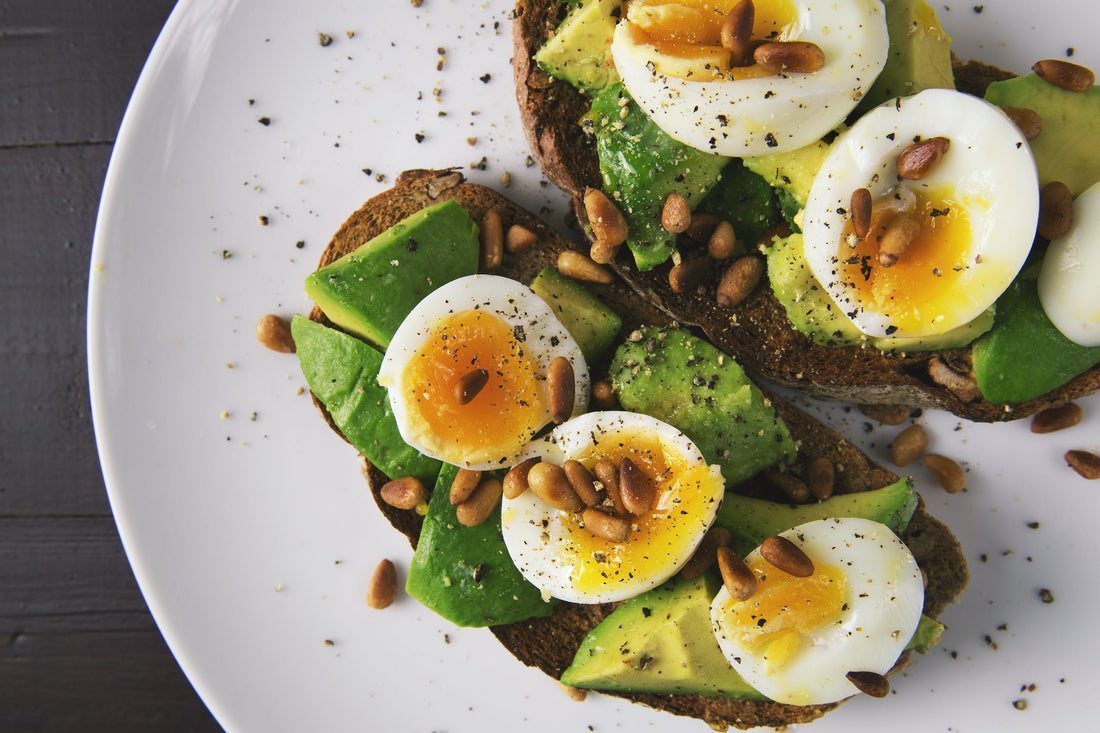They say that the first meal of the day is the most important one, and we couldn’t agree more. Our bodies are a lot like cars: once the fuel tank for food is empty, we start to feel and notice the effects, and fast.
When you wake up and start your day, it’s likely that you’ve gone 12 hours or more without eating. At this point, your body has digested and absorbed most or all of your food, meaning the glucose levels in your blood which give energy to your body and your brain are at their lowest.
Here’s all of our best tips on how to make the most of your morning meal, including what a healthy breakfast should include, what to avoid, breakfast ideas and more!
What should be included in a healthy breakfast?
A nutritiously fulfilling breakfast is the best way to start your day, especially when it’s prepared with fresh ingredients. A healthy breakfast should include:
- Complex carbohydrates: these include whole grains, wholemeal bread or vegetables.
- A good source of protein and ideally some healthy fats: plant-based breakfast foods that are high in protein include eggs, nuts and seeds and unsweetened or natural yoghurt.
Don't forget your supplements
In addition to a healthy breakfast, taking your supplements is the best way to take care of your body and mind. Our Algae Vitamin D3 supplements and Algae Omega 3 supplements are a great place to start!
What breakfast foods should I eat less of?
It’s perfectly OK to enjoy a sweet treat for breakfast from time to time, but regularly reaching for more sugary options can lead to a spike in your blood sugar levels, which in turn can tell your brain that you’re still hungry. Breakfast food options that are not as nutrient-dense include:
- Breakfast cereals: the majority of breakfast cereals you’ll find on supermarket shelves contain added sugar. Even those that are marketed as “healthy” such as whole grain cereals can be loaded with sugar (including sugar in other forms such as honey, and dextrose), so make sure to check the traffic light labels if you’re ever unsure. The best breakfast cereals are those that are made from whole oats or whole wheat with no added sugar - just mix in some fruit and extra nuts and seeds to increase your protein and healthy fat intake.
- White bread, pastries or crumpets: these are all made with refined white flour which quickly turns to sugar in your body. They will give you a blood sugar spike but leave you hungry again after a couple of hours.
- Toast with jam or marmalade: even if you use wholemeal bread, toast with jam or marmalade isn’t considered to be balanced because it’s high in sugar and lacks protein and healthy fats.
- Fruit on its own or with carbohydrates only: fruit can be high in natural sugar and won’t fill you up for very long. It’s better to combine just one piece of fruit with some protein, for example a natural yoghurt with chopped nuts.
What are the benefits of eating a balanced breakfast?
Here are five health-boosting reasons why you should try to eat a balanced breakfast every day.
- Gives you sustained energy for the morning: a nutritious breakfast can replenish your glucose levels but with a slow and steady release to support your energy until lunchtime.
- Fuels your brain for concentration, focus, memory and good mood: The brain runs on glucose, so your mental and physical energy will be affected if levels drop too low. After eating a healthy breakfast, you’ll likely notice an improvement in your mood and productivity while working or studying.
- Supports your metabolism: A good breakfast can support how quickly and efficiently your body burns calories. Skipping breakfast can slow your metabolism and actually encourages your body to hold on to fat and calories, which is known as “starvation mode".
- Helps with weight loss: if your blood sugar level drops too low because of a skipped breakfast, you’ll be more likely to want to snack on sugary or “quick-fix” foods and overeat later in the day.
- Provides other vital nutrients: balanced breakfasts are packed with vitamins, minerals, protein and healthy fats which you may struggle to get enough of in just two meals a day.

Healthy Breakfast Ideas
Hungry for more? Here’s some food for thought! Check out these deliciously balanced breakfast ideas which contain all the food groups you need for an energised start to your day.
- Sweet Healthy Breakfast Idea: chop up your favourite choice of fruit and pair it with full-fat organic plain yoghurt before topping your bowl with a sprinkle of nuts or seeds.
- Savoury Healthy Breakfast Idea: plate up several oatcakes or rice cakes and serve them with boiled eggs, green salad and butter or hummus to dip. We recommend batch boiling your eggs to use throughout the week - they can keep up to 3-5 days in the fridge if left in their shells.
- Savoury Healthy Breakfast Idea: using a fork, mash up half an avocado on toasted rye bread and serve with boiled eggs, lemon juice and seeds on top. Not a fan of avocados? Try swapping out the avocado spread with hummus or your favourite nut butter.
- Quick Healthy Breakfast Idea: add 1-3 tablespoons of low GI granola to a bowl and serve with a small dollop of organic full-fat plain yoghurt to the side.
- Smoothie Healthy Breakfast Idea: blend water with one portion of protein powder, 3 tablespoons of jumbo oats, 1 tablespoon of chia seeds, ½ a banana or one apple, 1 tablespoon of raw chocolate powder to create a mouth-watering smoothie. You can add any other superfood you like such as spirulina or a handful of spinach leaves for an extra health boost.

The Importance Of Breakfast For Children
Breakfast is even more important for children as it helps to fuel their growing bodies and brains. A healthy breakfast can improve a child’s concentration, behaviour and performance at school, and it’s also a great foundation for maintaining a healthy weight, good eating habits and good health as they grow up.

